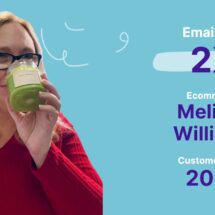Lead generation for coaches: Strategies to supercharge your coaching business
By Phil Norris March 19, 2024
Coaching is all about helping people achieve their goals — whether in business, relationships, health, or anything else.
But if you’re going to build a successful online coaching business, you need a constant stream of new leads. People who are interested in your advice and support, and who could be tempted to pay for your services with a little gentle persuasion. That’s why the best coaches also have the best marketing strategies.
Want to find out how they do it?
You’re in the right place. In this article, we’ve rounded up our top strategies on lead generation for coaches, backed up by a bunch of real-world examples.
Let’s get into it…
Key elements of lead generation for coaches
As you’ll see from this article, there’s no shortage of lead generation strategies for coaches. But most of them share two critical components:
So before we start exploring individual strategies, let’s break down what those two elements are, how they work, and why they’re so valuable.
What is a landing page?
A landing page is a standalone web page built to achieve a specific goal. For someone running a coaching business, those goals might include:
- Signing up for an online course
- Downloading a piece of content
- Booking a coaching session
Potential coaching clients arrive on a landing page after clicking through from an external source, such as a search engine results page or paid search listing on Google, or a social media advert.
Landing pages are so effective at turning traffic into leads because they strip out all the distractions that might dissuade a visitor from converting.
To demonstrate why they work so well, let’s compare a dedicated coaching landing page to a standard coaching web page (in this case, the homepage of mid-life business coach Shaheen Plunier).
First up, here’s her homepage:
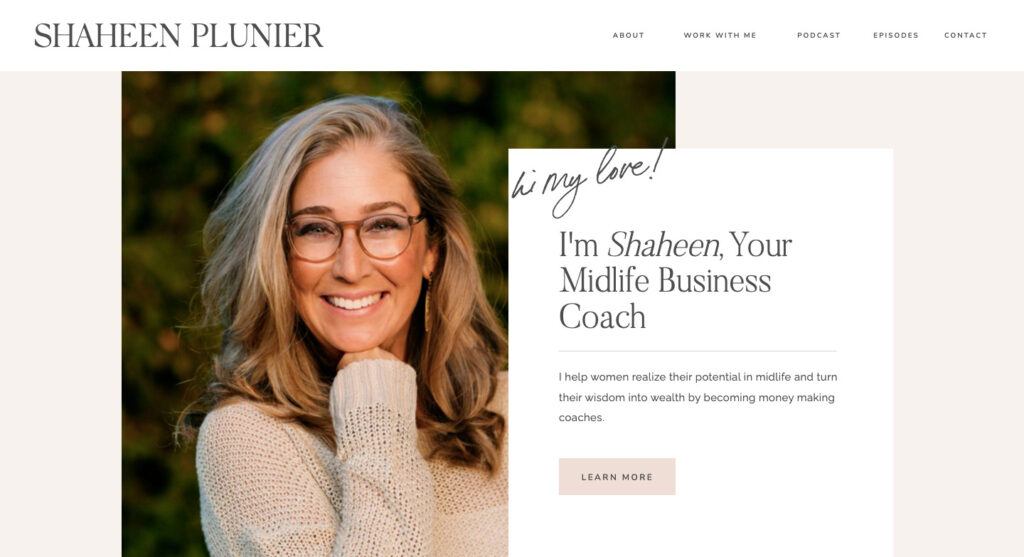
It contains no fewer than eight different calls to action (CTAs), plus a top navigation menu pointing visitors toward Shaheen’s “About” page, podcast, and more. The page does a fantastic job at persuading people to click deeper into the site and learn more about her background and expertise. But there’s simply too much noise for it to be a consistent lead gen tool.
By contrast, here’s the standalone landing page for her current (at time of writing) Facebook and Instagram ad campaign:
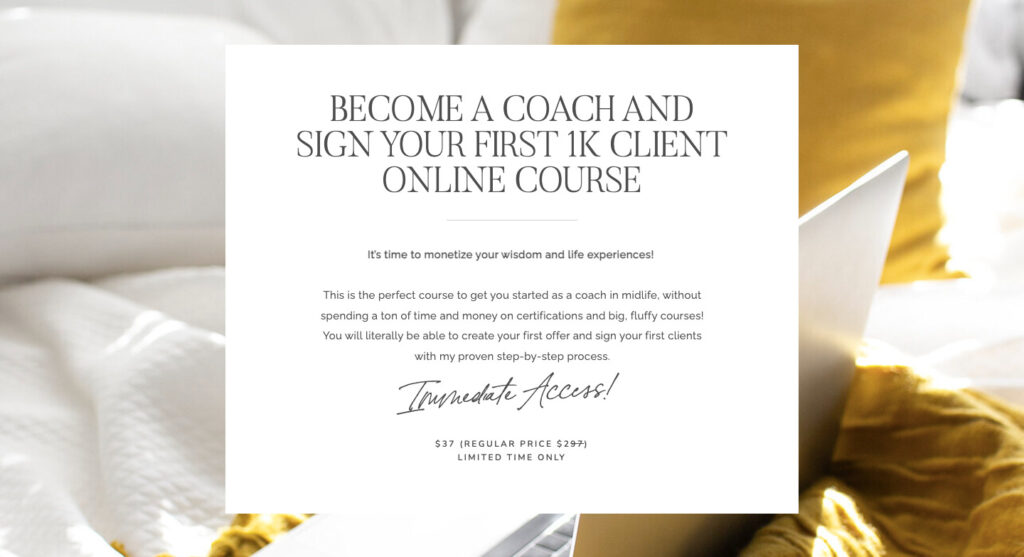
Click to explore full landing page
There’s no clutter at all: no navigation menu; no internal links; no conflicting CTAs.
Just one simple, clear prompt to sign up for her online course, repeated multiple times throughout the page:

Plus it’s loaded with persuasive messaging, including a limited-time discount and tons of glowing customer testimonials.
No one who visits this landing page will have any doubt about what Shaheen wants them to do next.
So they’ll either convert straight away or bounce.
All of which helps to explain why the average landing page has a conversion rate of 9.7%, versus 2.9% for a “regular” web page.
👉 Learn more: 7 tips to build a high-converting Facebook landing page
What is a lead magnet?
Many coaches are already using landing pages to capture leads.
But there’s a problem: only about one-third of consumers are willing to share their email address with a brand for no incentive.
In contrast, nine in 10 would be happy to share that data if they were offered something of value in return.
That brings us neatly to the second key element of lead generation for coaches: lead magnets.
A lead magnet is some kind of asset you can offer in exchange for a potential coaching client’s contact information. The asset in question is typically accessible via a dedicated landing page — often containing an embedded lead form — that exists with the sole purpose of capturing visitors’ email addresses.
Once you’ve got hold of their contact details, you can nudge them along the path to purchase through email marketing and retargeting campaigns.
5 lead magnet ideas for coaches
For your landing page and lead magnet combo to function as an effective lead generation engine, you need to build an asset that’s attractive enough to persuade potential coaching customers to hand over their contact information. It needs to offer something useful, like the solution to a common audience pain point.
Potential lead magnets for coaches include:
eBooks
Probably the most common lead magnet format, eBooks are pdfs that can be downloaded in exchange for an email address (and possibly some other details).
They tend to focus on broad, top-of-the-funnel topics rather than subjects likely to generate instant sales. For instance, Guitar Coach Mag offers a “tab book” containing dozens of classic guitar riffs:
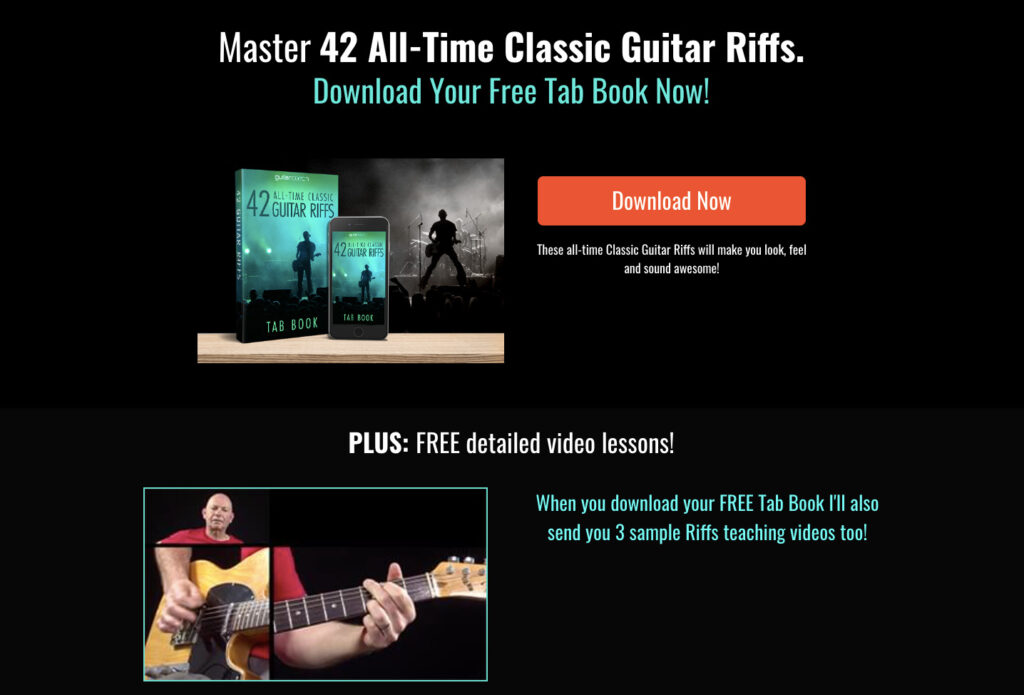
Click to explore full landing page
Most people aren’t going to immediately pay for guitar coaching after a couple attempts at shredding along to Stairway to Heaven. But they might be inclined to check out more of Guitar Coach Mag’s content, read their newsletters, and engage with their social posts.
Live webinars
Live webinars are just what they sound like: live video presentations in which the host tackles a topic while showcasing their expertise. They’re sometimes branded as “masterclasses”, like this example from Wanted Woman:
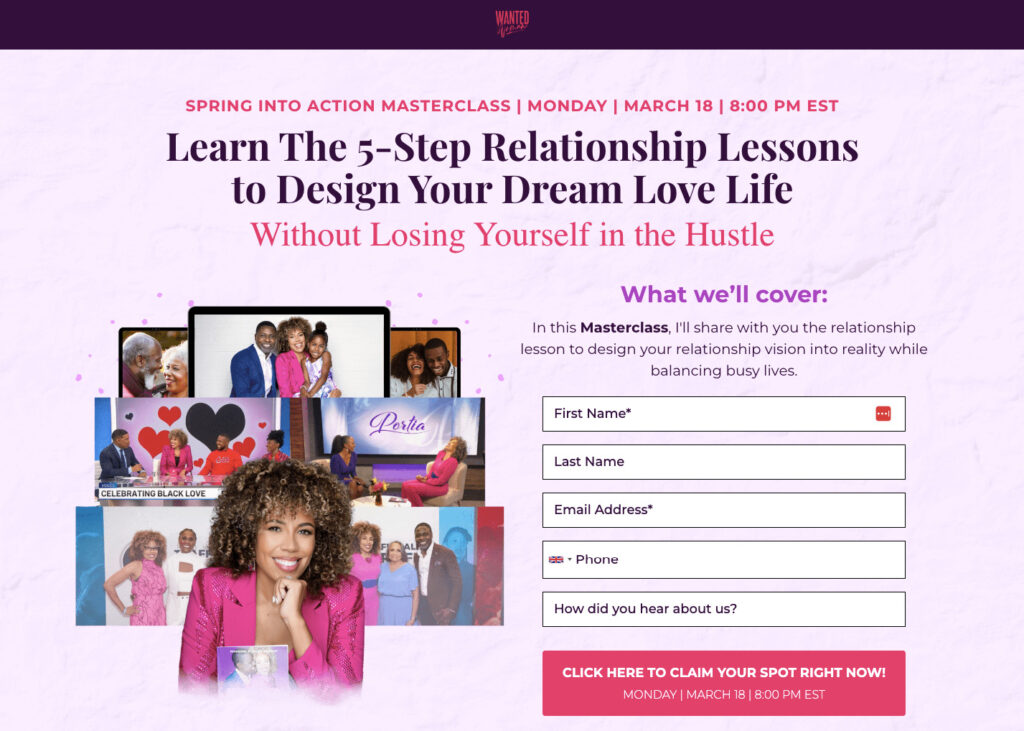
Click to explore full landing page
Live webinars take a lot more effort to produce than most other lead magnet formats. Plus you need to feel comfortable on camera to pull them off. And because they take place at a specific time on a specific date, not everyone will be able to attend.
But there’s a massive upside: because live webinars are interactive, they’re highly engaging. Audiences are far more likely to pay attention than if they were reading an ebook or watching an evergreen video.
Checklists
Like the sound of producing an eBook, but want to create something more actionable? Checklists could be the perfect option, giving you the opportunity to provide practical, step-by-step guidance around a specific problem or goal.
For instance, Peter Scott IV has put together a checklist to help wannabe coaches launch their own coaching businesses:
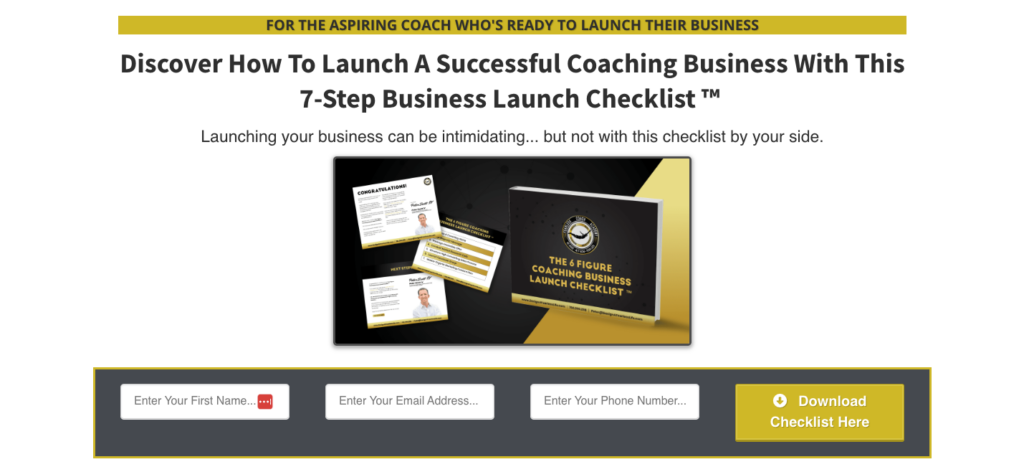
Click to explore full landing page
Checklists are easy to produce, user-friendly, and valuable to your prospective clients — provided you have genuine expertise to share.
Evergreen videos
Evergreen videos are often similar to live webinars, featuring a host instructing viewers on how to overcome some kind of challenge or achieve a specific goal. For instance, this 30-minute free training video from Ready Set Coach could just as easily have been a live webinar:
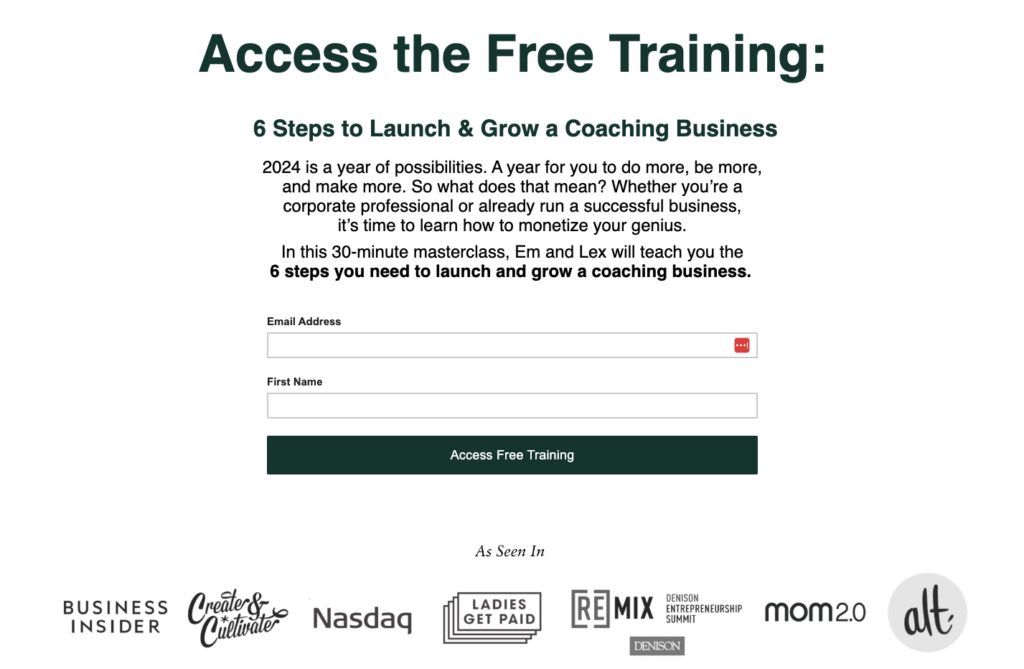
Click to explore full landing page
The big difference, of course, is that users can access this content at any time.
Evergreen videos are an easier “sell” than webinars because they require less commitment on the prospect’s behalf; you can simply dip in and out at your leisure.
However, they lack the interactivity of a live webinar, and they don’t give you the opportunity to pitch your coaching expertise, in person, to a captive audience.
Online courses
Plenty of people build a full job replacement income selling online courses. But you can also use them as lead magnets for your coaching business, just like this example from Yamuna Bihari, founder of Conscious Business Mastery:
Click to explore full landing page
If your content sounds valuable enough, you can even sell your online course at a low price to get leads through the door, then encourage them to sign up for your premium coaching services down the line.
👉 Learn more: How to create a lead magnet in less than a day (that actually works)
5 lead generation strategies for coaches
For coaches, leads are worth their weight in gold. So it’s vital you leverage the most impactful lead generation strategies to keep driving landing page traffic and lead magnet downloads.
In our view, these are the most effective lead gen channels for coaches:
SEO
No bones about it: you’ll have to put in a ton of work to rank at the top of Google for high-value keywords. If you want instant gratification, look elsewhere.
But search engine optimization (SEO) can be well worth the investment because it’s one of the few free ways to bring visitors to your landing page.
Best of all, you know those visitors are interested in the services you provide — because they’re actively searching for them. So when someone clicks through from a search engine results page, there’s a good chance they’ll be happy to give you their contact information.
Let’s see how online fitness and nutrition coaching business Nerd Fitness uses an SEO landing page for lead generation.
It ranks at #3 in the US for the term “online fitness coaching” (1,500 estimated global searches per month):

That ranking is held by a dedicated SEO landing page designed to sell visitors on the Nerd Fitness approach to health and fitness:
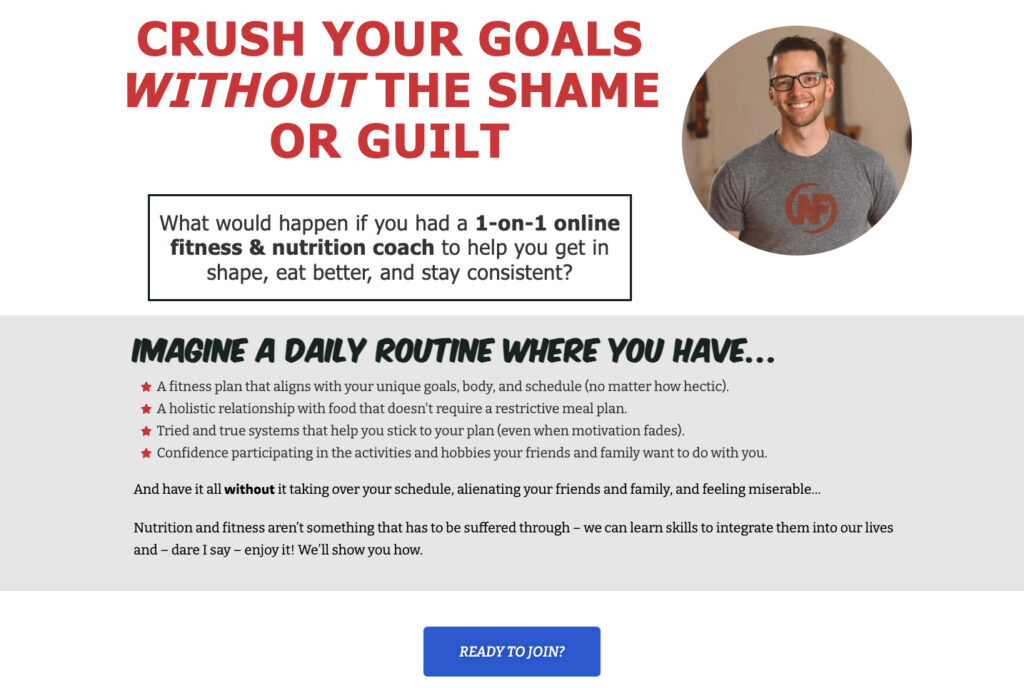
Click to explore full landing page
It’s an extremely long page. We’re talking dozens of screen scrolls and thousands of words to reach the bottom. But Nerd Fitness uses that space wisely by mentioning specific fitness goals…

…outlining the problems of “traditional” approaches to health and fitness…

…providing a breakdown of the Nerd Fitness coaching program…

…and, finally, closing the deal by prompting visitors to book a phone consultation:

Clearly, it’s way more in-depth than your average landing page, likely because it was built with SEO in mind.
One of the most important ranking factors is the number of quality backlinks pointing at a given web page: those with more links from authoritative external sites tend to rank better. And long-form content gets an average of 77.2% more links than shorter pages.
(For reference, the Nerd Fitness landing page had 5,500+ backlinks at time of writing. That’s a lot.)
👉 Learn more: Landing page SEO best practices: A step-by-step guide
Social media ads
Social media ads attract less-qualified traffic than SEO because they’re targeting people browsing platforms like Facebook, Instagram, and TikTok, rather than audiences who are actively searching for a given topic.
However, they’re a quick and highly scalable way to reach potential coaching customers who match your ideal client profile.
You can build an ad, set your targeting preferences and budget, hand over your card details, then start generating traffic to your landing page — all in just a few minutes. And if you want to bring in more traffic, you can just increase your ad spend.
Let’s see how the confusingly named One One Coach uses Facebook and Instagram ads to send people to its landing page:

The caption for this ad tells a (supposedly) relatable story designed to resonate with prospective clients. Because who hasn’t spent $700 per month on a nutritionist and personal trainer?
The whole purpose is to demonstrate the value and benefits of a One One Coach course compared to the high costs of in-person coaching. If you like what you hear, you’re prompted to click through to this landing page…
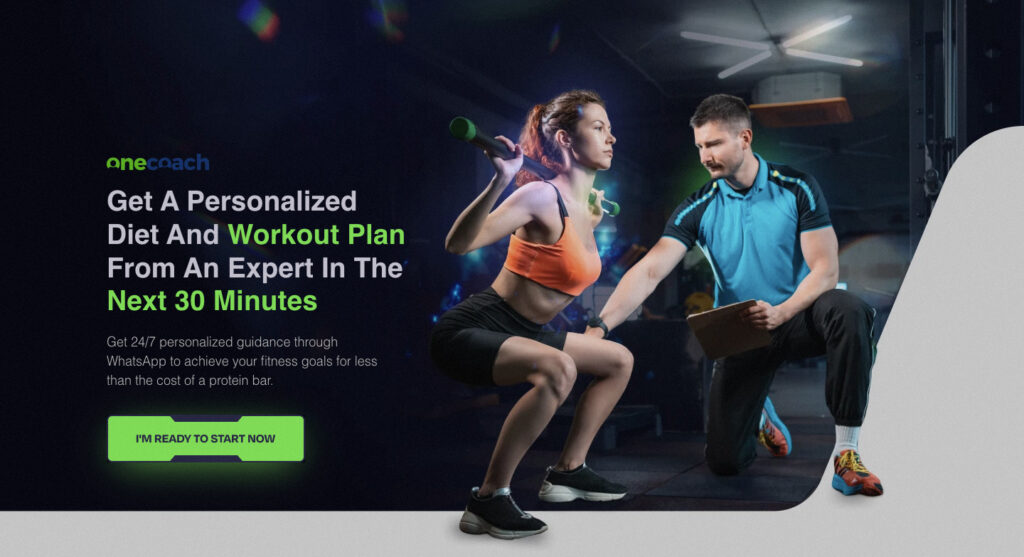
Click to explore full landing page
…where you can hand over your details in return for a personalized workout plan and diet regime.
Guest blogging
Writing guest blogs allows you to demonstrate your expertise to readers of websites that are relevant to your audience.
If someone reads one of your guest articles and likes what they see, they might be tempted to find you on Google or (ideally) click through to your site via a link in the “About the author” section.
Getting featured by authoritative, high-traffic publications is no easy task. It’s a classic example of a seller’s market: big publishers know how beneficial it’d be for them to feature your name, website, and content, so they make you jump through hoops for it.
You’ll need to have interesting, relevant, unique content ideas — plus the expertise to turn those ideas into high-quality content. Some high-profile sites even charge people to publish their guest posts. But, like SEO, the rewards can be well worth the effort.
Melissa Dawn, founder of coaching business CEO of Your Life, clearly agrees. She’s written a whole series of guest blogs for Brainz Magazine, which describes itself as “a global digital magazine focusing on exclusive interviews, articles and information on entrepreneurship, personal development, leadership and lifestyle”.
Not hard to see why a business coach would want to reach that audience, right?
Here’s one of Melissa’s articles for Brainz…

…and here’s the “About the author” profile at the bottom of the article, incorporating links to her website and social media profiles:

Melissa can feel pretty confident that anyone who clicks through to her website will be an ideal candidate for her coaching services.
Google ads
In many ways, Google ads are the ideal intersection between search engine optimization and social media ads.
You’re targeting qualified prospects searching for keywords that align with your coaching services, without having to wait weeks or months for your SEO landing pages to start ranking.
The downside is that Google ads aren’t cheap, with an average cost per click of $4.22. And you have to pay regardless of what happens when someone clicks through to your landing page, so there’s no guarantee all that expenditure will translate to leads and sales.
Sounds pretty risky when we put it like that, hey?
Life coaching business Well Coached Life evidently thinks advertising on Google is worth the money.
It runs various advert types, from simple text ads…

…to more eye-catching image ads…

…and even video ads:
You’ll need to do some math when deciding whether Google ads make sense for your coaching business.
For instance, let’s say you pay $422 for 100 clicks, and your landing page has a 5% conversion rate, resulting in five leads.
That means you’re paying $80+ per lead. Which is fine if you typically earn hundreds of dollars from every coaching lead you generate. But it’s a big problem if you sell lower-value services and/or don’t expect many repeat purchases.
Affiliate marketing
Affiliate marketing involves using bloggers, website owners, social media influencers, and other content creators to promote your coaching services for you.
Why would they do that? Because you pay them a commission for each lead or sale they generate.
For instance, grief coaching business From Grief To Gratitude gives its affiliates a 20% cut of every coaching customer they refer:
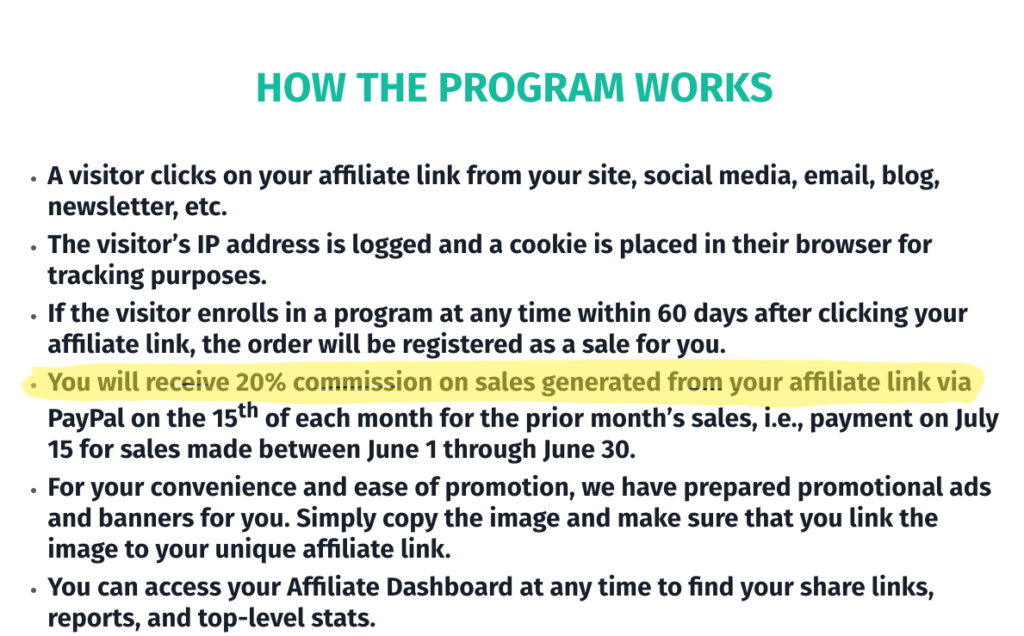
With the company’s coaching program priced at $777, this translates to a commission of $155.40 per sale.
Sure, that sounds like a lot of money, but From Grief To Gratitude still retains 80% of the sale value. And if their affiliates don’t generate any sales, they don’t have to hand over a single cent in commission payments.
Generate more coaching leads with AWeber
Before you start splashing the cash on Facebook ads or building an affiliate program from scratch, there are three key boxes to tick.
You need:
- A landing page
- A lead magnet
- An email marketing tool to convert your leads into paying customers
In short, you need AWeber.
We give you the tools to build attractive, high-converting landing pages — even if you don’t know how to code.
And we save you hours of work by making it easy to design and launch automated email sequences for welcoming new leads, demonstrating the benefits of your coaching services, and closing the deal.
Sounds good, right?
Sign up for your free AWeber account today!
 87% off ends soon!
87% off ends soon! 
